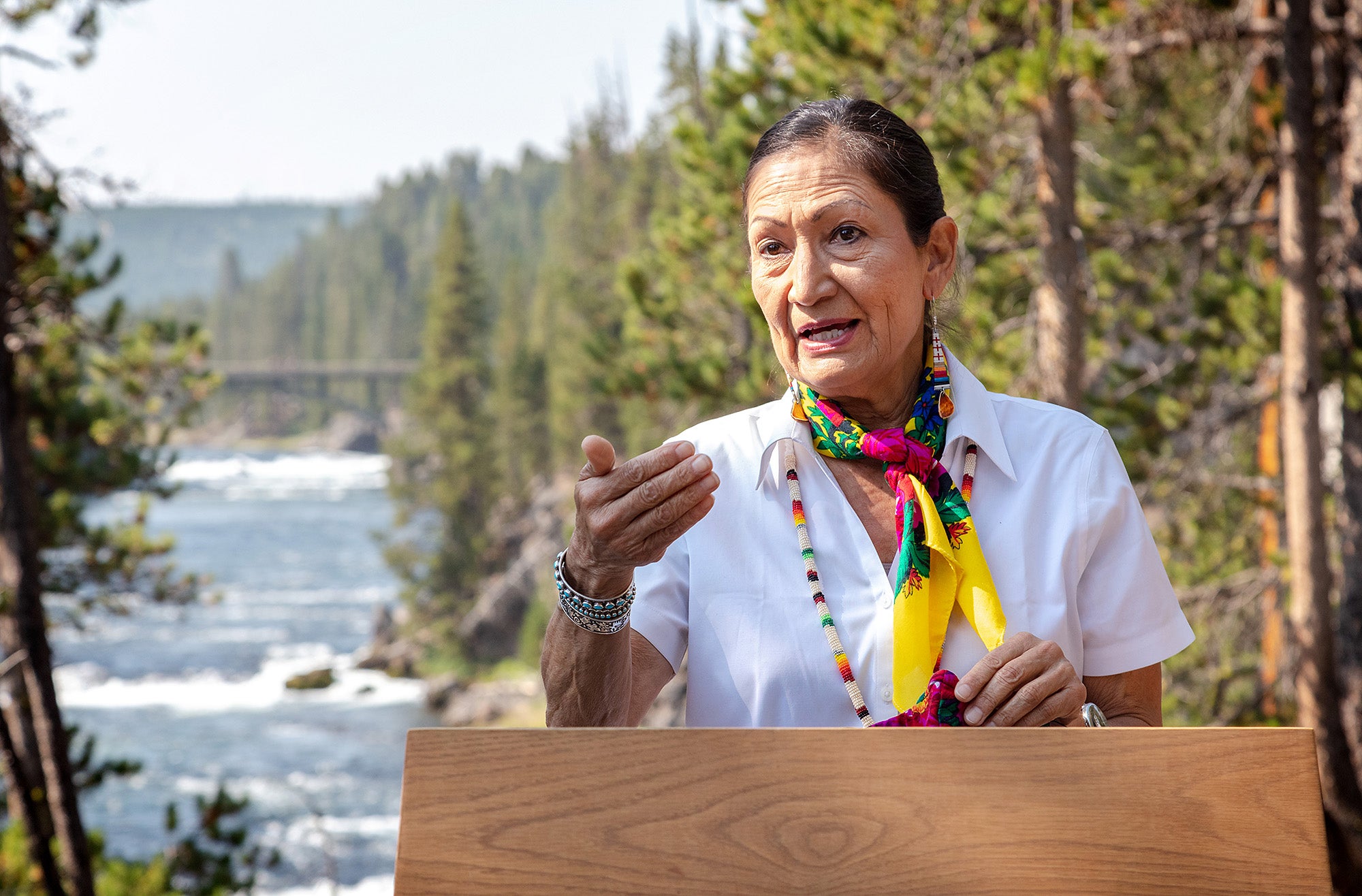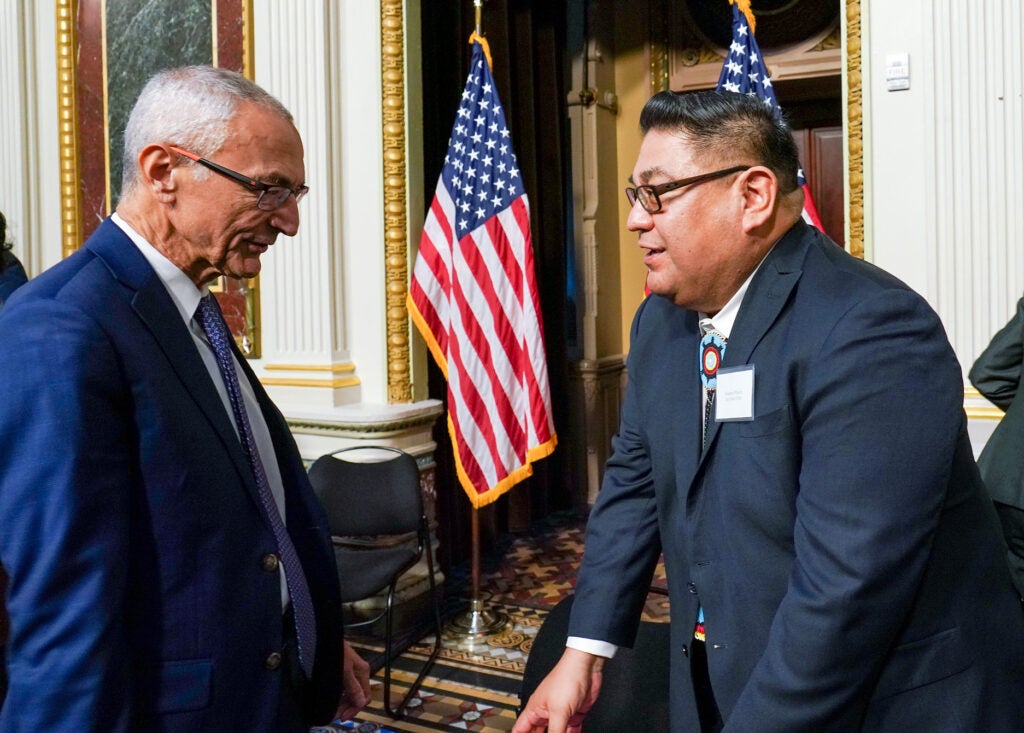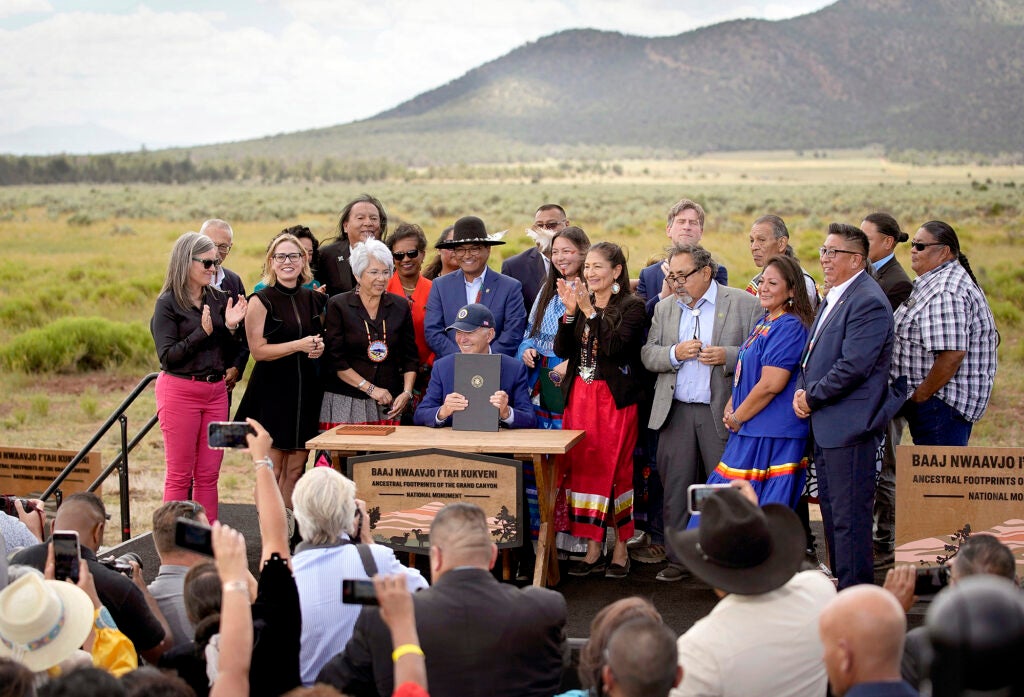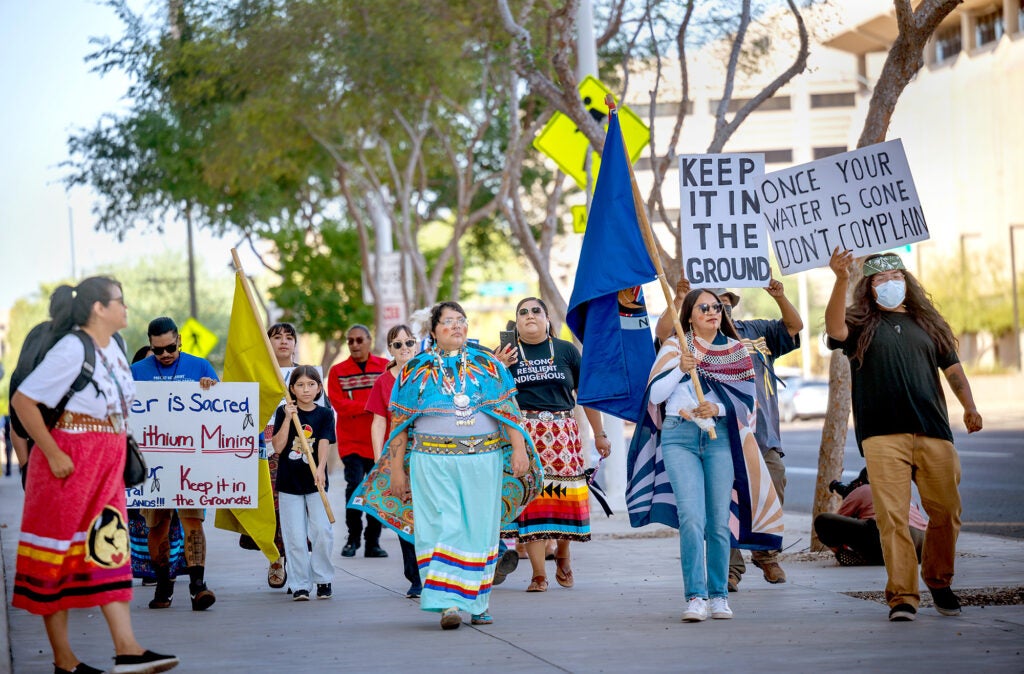The Biden Administration’s Record on Tribal Rights
To adapt to and withstand the challenges of climate change, we must respect Indigenous knowledge and protect Tribal rights. Here’s where this administration stood.

This page was published a year ago. Find the latest on Earthjustice’s work.
Averting the worst impacts of climate change and preserving a livable planet will require rapid and radical change at every level. That includes incorporating Indigenous knowledge rooted in thousands of years of continuous land stewardship practices into our nation’s climate plan.
Yet, centuries of violence, displacement, ethnocide, and outright theft by the U.S. government have left many Tribes disproportionately vulnerable to the climate crisis. Indigenous peoples today face serious threats from fossil fuel and mining companies who’ve put clean water, sacred sites, and Indigenous ways of life in their crosshairs. To tackle climate change, the federal government must protect Indigenous rights and strengthen Tribal sovereignty.
So how did the Biden administration do on Indigenous rights? Earthjustice proudly partners with and represents over 100 tribes, Alaska Natives, Native Hawaiians, and other Indigenous groups who are fighting to protect their water, wildlife, and sacred lands from extractive industries. Here’s our take.
Where progress has been made
In contrast to previous administrations, which were often openly hostile to tribes, the Biden administration has taken steps to support Tribal leadership and affirm Native American rights in several ways.
Respecting Indigenous Knowledge: Federal decision-making is more informed than ever before by Indigenous practices and experiences. Traditional Indigenous knowledge, accumulated through centuries of land cultivation, emphasizes reciprocity between living beings and their ecosystem, and decision-making that ensures a sustainable world for generations to come. Yet Traditional Ecological Knowledge, or TEK, had typically been excluded from public land management, leading to limited ecological understanding hindering conservation and restoration efforts.
In 2022, the Biden administration released government-wide guidance to include TEK in federal research, policy, and decision-making. More recently, the Council on Environmental Quality included Indigenous Knowledge and protection of Tribal sacred sites in the National Environmental Policy Act Regulations, and the Department of Interior formally incorporated TEK into its Public Lands Rule.
Improving consultation efforts: Consultation is a critical acknowledgement of tribal sovereignty, the inherent right of tribes to govern themselves, their lands, and their people. The U.S. government has a duty to consult with tribes, on a government-to-government level, on projects that could impact Indigenous rights and resources, for example, in making permitting decisions for mines or pipelines that could pollute tribal drinking water or destroy wildlife habitat. Federal agencies often treat consultation like a box to tick, or an optional practice. Even when tribes warn agencies that a project will lead to irreparable and catastrophic harm, it’s rarely changed plans.
The Biden administration has made a significant effort to fix this process. Six days after taking office, President Biden issued a memorandum requiring all federal agencies to create detailed plans for meaningful consultation with tribal nations. In 2022, the administration put forward baseline standards to strengthen and streamline those policies.

White House senior advisor John Podesta, left, talks with Nez Perce Tribe Chairman Shannon Wheeler at a White House signing ceremony for an agreement to protect fish in the Columbia River Basin. (Department of the Interior)
Recognizing and honoring treaty rights: In addition to supporting tribal sovereignty, the administration has taken significant steps to recognize and honor treaties. In 2023, President Biden signed a Presidential Memo pledging a national effort to restore healthy and abundant native fish populations in the Columbia River Basin to uphold treaty obligations signed in 1855 that promised Tribal Nations in the Pacific Northwest the rights to hunt, gather, and fish for salmon and other native species in exchange for millions of acres of their lands. The memo was followed by a 10-year agreement signed with the four lower Columbia Basin Treaty Tribes, the states of Oregon and Washington, and Earthjustice plaintiffs. The agreement begins implementing comprehensive basin-wide recovery according to a plan developed by the Tribes and states, and is backed by $1 billion in federal funding.
The Biden administration has also pushed to incorporate treaty rights in clean water standards. Under the Biden administration, the Environmental Protection Agency enacted a rule that requires state governments take tribes’ treaty rights and water quality needs into account when setting standards under the Clean Water Act. Without this rule, tribes can be subjected to health impacts from underregulated water quality. Earthjustice helps represent 12 tribal nations defending this rule from attack by a group of states that have sued to dismantle it.
Promoting Native American leadership: Deb Haaland made history in 2020 when she became the first Native American to serve as a cabinet secretary. As Secretary of the Department of the Interior, she leads an agency responsible for the nation’s 1.9 million Native people, overseeing about 500 million acres of public land, a vast number of dams and reservoirs, and the protection of thousands of endangered species.
Under the Biden administration, Native American leaders have also been appointed to high-ranking positions at the U.S. Army Corps of Engineers, the National Park Service, and the U.S. Department of Agriculture, and the federal judiciary.
Pushing for co-management and co-stewardship: The Biden administration has pushed for federal agencies and tribal nations to share in the management and stewardship of U.S. federal public lands, all which were once Indigenous territory.
In June 2022, the Bureau of Land Management, the U.S. Forest Service, and the five Tribes of the Bears Ears Commission — the Hopi Tribe, Navajo Nation, Ute Mountain Ute Tribe, Ute Indian Tribe of the Uintah and Ouray Reservation, and the Pueblo of Zuni — formalized co-management of Bears Ears National Monument in Utah. More recently, President Biden designated two new national monuments to be co-stewarded with tribes: Avi Kwa Ame National Monument in Nevada, and Baaj Nwaavjo I’tah Kukveni – Ancestral Footprints of the Grand Canyon National Monument in Arizona. Under the Biden administration, the federal government entered into a number of other co-management agreements.

President Joe Biden holds up a proclamation designating the Baaj Nwaavjo I’Tah Kukveni National Monument at the Red Butte Airfield Tuesday, Aug. 8, 2023, in Tusayan, Ariz. (AP Photo/John Locher)
Funding tribal-led climate projects: The Inflation Reduction Act, Biden’s landmark climate investment bill, directs over $722 million specifically to Tribal and Indigenous communities. It includes another $46 billion that Tribal and Indigenous communities are eligible to apply for to fund things like rebates on electrification, coastal resilience grants, home repairs, and improving and adapting fish hatchery operations. Over the last four years, there has been a large increase in funding for tribal infrastructure, climate readiness efforts, and clean energy development.
What remains unfinished
While the Biden administration ushered in significant wins for Indigenous peoples, the federal government has only started to mend its broken relationship with tribes. To continue making progress, agencies need to do better in these arenas.
Stop mining without consultation: The Biden administration has incentivized the mining of lithium, nickel, and other transition minerals, often at the expense and without the consent or input of Tribal Nations. This needs to change. While we must rapidly transition to a clean energy economy, our 19th-century mining laws have let the mining industry get away with far too much damage and far too little accountability. By updating our mining regulations and engaging in meaningful tribal consultation, we can shift our energy system in a more just and sustainable way.

Members of the Hualapai Tribe march outside the US District Court for the District of Arizona in Phoenix, Arizona. The tribe sued the Department of Interior and Bureau of Land Management for illegally approving a plan to drill exploratory wells surrounding Hualapai lands and endangering their sacred hot spring called Ha’Kamwe’. (Ash Ponders for Earthjustice)
Respect Free, Prior, and Informed Consent: A just transition requires governments and companies to respect the rights of Tribal Nations and Indigenous peoples to Free, Prior, and Informed Consent (FPIC) on projects affecting their lands, waters, and cultural resources. Far too often, including under the Biden administration, projects are approved without honoring the principle of FPIC as set forth by the United Nations Declaration on the Rights of Indigenous Peoples.
We fight to ensure our tribal and Indigenous clients’ natural and cultural resources are protected for future generations.